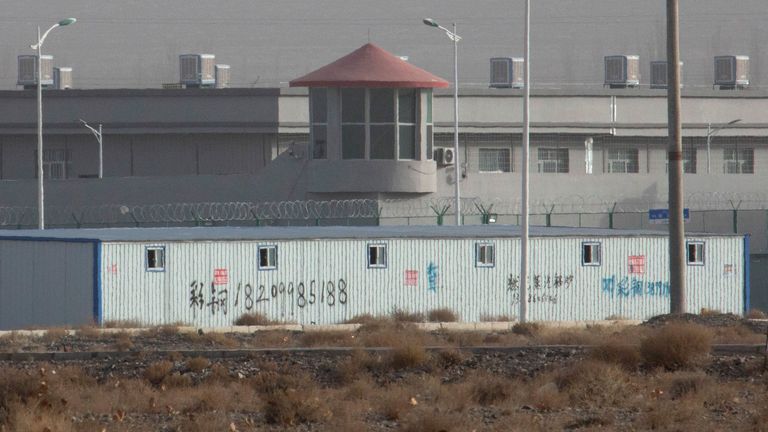Boris Johnson has said he "stands firmly" with MPs and other British citizens who have been sanctioned by China for speaking out against "gross human rights violations" against the Uighur people.
China has sanctioned individuals and organisations in the UK who it said "maliciously spread lies and disinformation" - days after the British government imposed sanctions on Chinese officials for alleged human rights abuses in Xinjiang.
MPs including former Conservative Party leader Sir Iain Duncan Smith and Tom Tugendhat, the chair of the House of Commons foreign affairs committee, were among those named by China's foreign ministry.
It means they will be banned from entering Hong Kong and Macau as well as mainland China.
Organisations including the China Research Group of MPs and Essex Court Chambers, which published a legal opinion describing China's actions in Xinjiang as genocide, were also included in the sanctions.
The prime minister has given his backing to those targeted by sanctions, arguing they were "performing a vital role shining a light on the gross human rights violations" being carried out against the Uighur Muslims in the northwest province.
Mr Johnson tweeted: "Freedom to speak out in opposition to abuse is fundamental and I stand firmly with them."
Foreign Secretary Dominic Raab also expressed his support, writing on Twitter: "While the UK joins the international community to sanction human rights abuses, Chinese govt sanctions its critics."
Sir Iain has described the sanctions as "a badge of honour".
Highlighting the abuses of the Uighur's, he told Sky News: "We are literally, I believe, seeing genocide take place there as they attempt to exterminate a whole ethnic group."
He said the casual language used by Beijing about the internment camps "was redolent" of that used by the Nazis.
He added: "As far as I am concerned I intend to continue to speak out. Speaking out for the Uighur people and others who have no voice at the moment is a badge of honour for us considering what they are going through."
Labour's shadow foreign secretary Lisa Nandy said the sanctions "will not succeed" as she condemned them as a "blatant attempt to silence British parliamentarians who are shining a spotlight on the appalling persecution of the Uighur people".
On Monday, the UK joined the EU, Canada and the US in sanctioning China - the first time the UK had imposed asset freezes and travel bans on Chinese officials.
China immediately imposed retaliatory sanctions on the EU, including on members of the European Parliament.
But it seems to have been relatively surprised by the British sanctions, taking several days longer to respond.
A Chinese foreign ministry spokesperson said the UK sanctions were "based on nothing but lies and disinformation" and that the move "severely undermines China-UK relations".
As well as the travel ban, sanctioned individuals are also forbidden from doing business with Chinese citizens or companies.
Others facing sanctions are Tory MPs Neil O'Brien, Tim Loughton, and Nusrat Ghani; peers Lord Alton and Baroness Kennedy; lawyer Sir Geoffrey Nice QC, and academic Jo Smith Finley.
In their legal opinion published in February, lawyers from Essex Court Chambers wrote: "There is a very credible case that crimes against humanity of enslavement, torture, rape, enforced sterilisation and persecution and the crime of genocide, are being committed against the Uighur population".
China has repeatedly denied the accusations and says the camps are voluntary training centres.
Analysis: Beijing risks unifying opponents with sanctions
By Tom Cheshire, Asia correspondent
The only surprise about China's sanctions on the UK was that it took them a whole week to respond.
The measures mirror the ones applied to the EU, targeting politicians, researchers and organisations.
Beijing will insist this is merely a reciprocal act.
And on the face of it, they will have little direct effect.
Iain Duncan Smith probably wasn't planning on spending his first post-pandemic foreign holiday in Xinjiang.
But they are important for two reasons.
The UK sanctions - along with corresponding ones form the US, the EU and Canada - targeted officials alleged to be conducting gross human rights abuses against the Uighur people.
Beijing's sanctions target critics of its policies, as the Foreign Secretary Dominic Raab pointed out in his response.
They do not target ministers but backbench MPs.
As we have seen with the "spontaneous" boycott of Western companies like H&M and Nike, who have prohibited the use of cotton from Xinjiang in their supply chains, Beijing wants to apply a cost to those who simply speak out against it.
That may have a deterrent effect - less so for outspoken politicians, but certainly for companies who rely on China for sales.
But it also has a corresponding effect on the countries being sanctioned by China.
The impact in the EU of China's sanctions has been to put at risk an investment agreement years in the making, and to unite European politicians - notably more dovish on China than those in the UK and US - in opposition.
China clearly wants to draw a line.
But it may find that by doing so, rather more people than it thought are standing on the other side.
https://news.google.com/__i/rss/rd/articles/CBMif2h0dHBzOi8vbmV3cy5za3kuY29tL3N0b3J5L2JlaWppbmctc3RyaWtlcy1iYWNrLWFmdGVyLXVrLXNhbmN0aW9ucy1hbmQtYWRkcy1zZW5pb3ItYnJpdGlzaC1wb2xpdGljaWFucy10by1pdHMtb3duLWxpc3QtMTIyNTY5ODHSAYMBaHR0cHM6Ly9uZXdzLnNreS5jb20vc3RvcnkvYW1wL2JlaWppbmctc3RyaWtlcy1iYWNrLWFmdGVyLXVrLXNhbmN0aW9ucy1hbmQtYWRkcy1zZW5pb3ItYnJpdGlzaC1wb2xpdGljaWFucy10by1pdHMtb3duLWxpc3QtMTIyNTY5ODE?oc=5
2021-03-26 11:03:45Z
52781463777820

Tidak ada komentar:
Posting Komentar